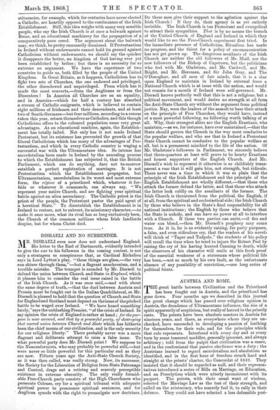DISRAELI AND NO SURRENDER.
AiiR. DISRAELI even now does not understand England. III His letter to the Earl of Dartmouth, evidently intended to give the cue to his followers in the coming contest, is not only a stratagem so conspicuous that, as Cardinal Richelieu says in Lord Lytton's play, "these things are glass,—the very sun shines through them,"—but a flagrant anachronism, and a terrible mistake. The trumpet is sounded by Mr. Disraeli to defend the union between Church and State in England, which it pleases him to consider the real issue raised in the battle of the Irish Church. As it was once said,—and with about the same degree of truth,—that the duel between Austria and Prussia must be fought out in the Italian Quadrilateral, so Mr. Disraeli is pleased to hold that the question of Church and State for Englandand Scotland must depend on theissue of thepitched battle to be waged over Ireland. " We have heard something lately," says the unblushing Premier, " of the crisis of Ireland. In my opinion the crisis of England is rather at hand ; for the pur- pose is now avowed, and that by a powerful party, of destroying that sacred union between Church and State which has hitherto been the chief means•of our civilization, and is the only seeurity for our religious liberty." There probably never was a more flagrant and deliberate attempt to raise a false issue. To what powerful party does Mr. Disraeli point? We suppose to the Nonconformists, who may probably be powerful still,—but were never so little powerful for this particular end as they are now. Fifteen years ago the Anti-State Church Society, as it was then called, was really strong. Now, its successor, the Society for the Liberation of Religion from State Patronage and Control, drags out a retiring and scarcely perceptible existence in extreme obscurity. The only really formid- able Free-Church party consists of the High Churchmen who persecute Colenso, cry for a spiritual tribunal with adequate spiritual power to pronounce spiritual sentences, and for Anglican synods with the right to promulgate new doctrines.
Do these men give their support to the agitation against the Irish Church ? If they do, their agency is as yet entirely invisible. The Irish Church is too Protestant and evangelical to attract their sympathies. That is by no means the branch of the United Church of England and Ireland in which they would like to see the Free-Church experiment first tried. In the immediate presence of Catholicism, Ritualism has made no progress, and the thirst for a policy of excommunication has not get grown up. The dangerous assailants of the Irish Church are neither the old followers of Mr. Miall, nor the new followers of the Bishop of Capetown, but the politicians who feel with Mr. Gladstone, and Mr. Cardwell, and Mr. Bright, and Mr. Horsman, and Sir John Gray, and The O'Donoghue, and all men of fair minds, that it is a slur upon England to maintain in Ireland by external force a National Church which is at issue with the nation, and would not remain for a. month if Ireland were self-governed. Mr. Disraeli knows perfectly well that this is not a religious, but a political movement, and would derive no strength at all from the Anti-State Church cry without the argument from political justice. Nay, were the leaders of the assault to base their attack on the principle of Free Churches, they would have, instead of a most powerful following, no following worth talking of at all. Why, their strongest allies are the English Erastians, who maintain,—as we, for instance, have ever maintained,—that the State should govern the Church in the way most conducive to the popular welfare, and who see that in Ireland a Protestant State Church cannot be conducive to the popular welfare at all, but is a permanent mischief to the life of the nation. Of Mr. Gladstone's followers in Parliament, we sincerely believe that three-quarters at least will prove to be hearty Erastians and honest supporters of the English Church. And Mr. Disraeli's wish to represent it otherwise is so childishly trans- parent a ruse that it will gain him, not strength, but ridicule. There never was a time in which it was so plain that the principle of the Irish Establishment and the principle of the English Establishment are wholly different,—that those who attack the former defend the latter, and that those who attack the latter look coldly on the assailants of the former. The Irish Church is threatened from the political, the English, if at all, from the spiritual and ecclesiastical side; the Irish Church by those who believe in the State's final responsibility for all national institutions ; the English by those who believe that the State is unholy, and can have no power at all to interfere with a Church. If these two parties can unite,—if fire and water can blend,—then Mr. Disraeli's prophecy may come true. As it is, he is so evidently raising, for party purposes, a false, and even ridiculous cry, that the readers of his novels will think of "Taper and Tadpole," the students of his policy will recall the time when he tried to injure Sir Robert Peel by raising the cry of his having hunted Canning to death, while the observers of his character will smile at this fresh proof of the essential weakness of a statesman whose political life has been,—not so much by his own fault, as the unfortunate absence of any possibility of conviction,—one long series of political feints.


































 Previous page
Previous page